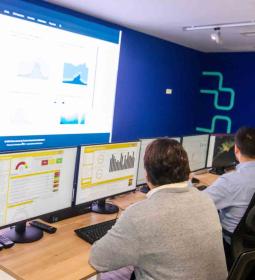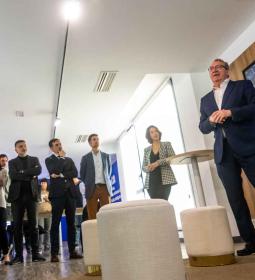Web
A website for the management of advanced telecare services in Benidorm.
A web application has been developed for the control and management of the alert and notification system that originates from the analysis of the data, which is systematically captured, from the water and electricity meters of the supplies of the people participating in the Benidorm Telecare project.
Let us recall this application in the architecture of the system.

The above table shows the architecture of a solution that contains the following elements: addresses of end users, data sources; which are the meters for each user's electricity and water consumption, the storage platform and the analysis of said data, together with a web application that displays the data and alarms generated from the original data sources.
How to access the website
Access to the Benidorm City Council website is done, in the current testing phase in which it is located, through a link to the development space of the provider of the same; IOTSENS, where it is hosted.
https://benidorm-iop.grupogimeno.com
Once you have access, you must authenticate yourself on the website. Each user has unique credentials provided by the administrators of the website.

Sections that make up the application:
Alarms
The first section that appears on the website is the alarm section, which provides a list of all the alarms generated by the system and, in addition, various filters are provided to locate specific alarms.
Each of the alarms has a series of associated statuses and comments to track the traceability of the alarm and its management.


Assisted
This assisted section shows a list of users who adhere to the anomaly detection platform, also taking into account the type or types of supply that are monitored for each assisted user.

A simple form allows you to add new patients to Benidorm Telecare service.

Alarm definition
The monitoring and early warning system is based on alarms that can be viewed and configured from this section.


The alarms have been configured on the web-based on an initial inventory defined by the project team, which establishes the origin of the alert, the causes of the alarm generation, as well as the possible consequences to be minimized by the action to be taken, which will be prioritized based on the criticality of each user.

Control panel
This section is used to monitor the alarm system correctly.
Several control panels have been configured to view the capture of electrical and/or water data in real-time.
One of them monitors the anomalies detected.

For the analysis of anomalies, a control panel has been created, which displays the results of the algorithms, where it is possible to filter by each of the assisted ones and in which the normal trend is shown in blue and the detection of an anomaly in red.

Users
This section manages the users who control the operation of the alarm system, as well as the profiles and permissions existing on the platform.


A new user can be created using a simple form.

The main conclusions of the web development shown and of the initial algorithms created for the detection of anomalies are the following:
The web covers the requirements and general purpose of the project, showing the detected alarms and their traceability and, through control panels, monitoring the part related to the capture of data from the two types of supply.
The web allows the management of both, the configuration of alarms and the users and assisted persons that will be monitored in the project.
It is possible to scale the service to new assisted persons simply by registering them on the website.
Access to electrical power, every 5 minutes, together with the downloads of hourly consumption data, allows us to know all types of alarms defined in our inventory, but, in particular, those considered, until now, most relevant to generate the urgent start of the defined assistance protocol, for example, when:
A- the user has consumption at night “not usual” for more than a certain period; >1h
B- the user has no variation (above the minimum that the refrigerator usually generates) in consumption during normal consumption periods for more than 4 consecutive hours.
More data needs to be collected to adjust the algorithms created so that, as the volume of data increases, the detection of alerts becomes more precise and the behaviour patterns can better fit the use of these supplies by those assisted.




